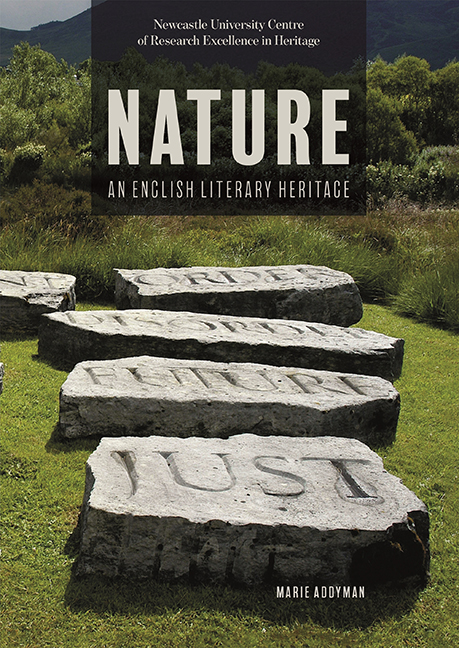Book contents
- Frontmatter
- Dedication
- Contents
- Acknowledgements
- Preface
- Introduction: Infected Minds
- I Nature as (A)morality and Mortality in Early Modern England
- II Living the Wild Life in the Nineteenth Century
- III Nature and History: Towards the Anthropocene
- Afterword: Apokalypsis
- Bibliography
- Index
- Previous Titles
- Frontmatter
- Dedication
- Contents
- Acknowledgements
- Preface
- Introduction: Infected Minds
- I Nature as (A)morality and Mortality in Early Modern England
- II Living the Wild Life in the Nineteenth Century
- III Nature and History: Towards the Anthropocene
- Afterword: Apokalypsis
- Bibliography
- Index
- Previous Titles
Summary
This book has argued that the concept of a literary legacy of nature implies that the transmission of a variety of responses and interpretations to what is understood as nature in a given text not only consistently reinvigorates literature but enables it to persist in taking a key role in offering different aspects of nature to contemporary culture. This may be by revisiting past ideas or by suggesting possibilities for those who come after. If in both the past and the present, literature has often used the topos of nature to reflect on itself as an essential feature of human creativity in ways that render our culture rich, pluralistic and expansive, nevertheless something more is required for a future tradition of nature writing in the period now referred to as the Anthropocene. We have now to think urgently and cogently in terms of ‘environmental humanities and arts’. This is urgent, and difficult, since ‘Western civilisation has decided to promote institutions of dislocation in every dimension of social and cultural existence [so that we live in] an aggravated confusion about what it means to dwell on the earth’ (Harrison 1992, 198–9).
It is perhaps particularly difficult for us at the time of writing this Afterword, when the second wave of COVID-19 is afflicting us. Amongst the many things which have thrown into question our everyday lives and our current values, a confusion about what nature is, what our responsibilities to it are, and what role it should play in our lives have all taken us beyond the nine categories Soulé proposed. On the one hand, flowers re-grew in the cracks of our city pavements and birds returned to urban gardens; on the other, litter and trashing of rural sites as people made their escape increased phenomenally. In all this, whether our heritage of creative writers can help us to find a suitable compass has, for some at least, also gone into the melting pot.
- Type
- Chapter
- Information
- Nature: An English Literary Heritage , pp. 297 - 304Publisher: Boydell & BrewerPrint publication year: 2021



